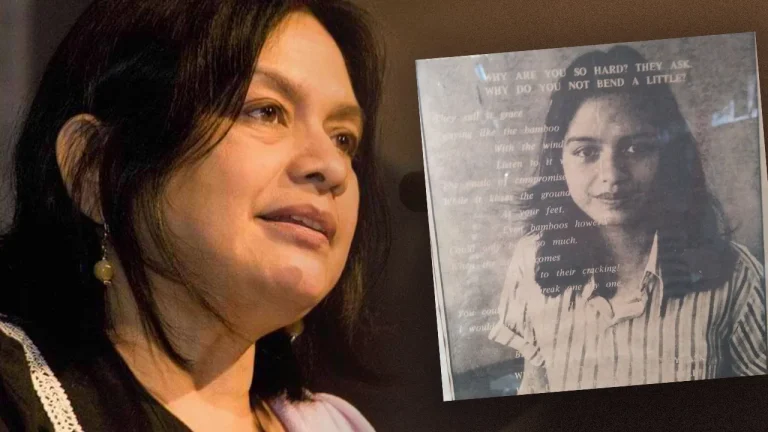
Sep 2, 2022, Jairo Bolledo
Sancho, who co-founded the women’s rights group Gabriela, died on September 1, the family confirms to Rappler
MANILA, Philippines – Beauty queens are highly regarded in this country obsessed with three “Bs”: basketball, boxing, and beauty pageants. They enjoy influence across the fashion and entertainment worlds, while some even thrive in politics.
But Nelia Sancho, a former Miss Philippines, picked a different path – one of fighting for human rights and pushing to empower women.
Sancho’s journey came to an end on Thursday, September 1. She left behind her children, Anna and Mark, and her grandchildren. Her death was confirmed to Rappler by her daughter, through Gabriela Women’s Party’s Liza Maza.
In a Facebook post, Sancho’s niece, Karen, announced the passing of her aunt.
Maza, former Gabriela party-list representative and former National Anti-Poverty Commission chief, mourned Sancho, whom she called a mentor in Gabriela: “Nelia was a friend, a comrade and mentor in Gabriela.”
Sancho co-founded the women’s rights group Gabriela with another former beauty queen, Maita Gomez.
Grace Mahinay, a Martial Law survivor, remembered Sancho, whom she called “Inday” as a term of endearment: “We were together briefly in the ’70s during Martial Law days before she was arrested in 1974 in Cagayan de Oro City. She dressed simply and talked in a malambing (sweet) and malumanay (calm) way.”
From titleholder to rights defender
Sancho embodied “beauty with a purpose,” a famous beauty pageant tagline.
She joined the Binibining Pilipinas pageant in 1969 and ended up as first runner-up (third place at that time). The eventual winner of that edition was Gloria Diaz, who went on to become the first Miss Universe titleholder from the Philippines.
Although Sancho did not go on to vie for major international beauty pageants, like the Miss Universe and Miss World, she clinched the Queen of the Pacific title in 1971. She bested 29 other ladies from the Pacific rim countries in the contest held in Melbourne, Australia.
In 1970, legendary Filipino fashion designer Pitoy Moreno recruited Nelia as a model.
At the University of the Philippines, Sancho was a grand archon of the Sigma Delta Phi sorority. She also served as a sponsor of the Reserve Officers’ Training Corps.
She left the lift of glitz and glamor, however, to fight the dictatorship of Ferdinand Marcos. She understood that a just society could only be realized if there were people fighting for the marginalized.
“The issue is not whether you are a communist or not. It’s whether you are working for the people or not. For me, that’s more important than identifying with any particular ideology,” Sancho said in an interview with The Age in 1981.
According to Dakila, an artists’ collective, Sancho became an active face of protests and immersed herself with the masses. She eventually fought underground “in pursuit of meaningful changes in the country.”
She witnessed the atrocity of Marcos’ dictatorial rule. In 1973, during a series of arrests of activists, her group called for a meeting to plan for their security measures.
However, government’s intelligence team found their meeting place in Malabon, when the city was still part of Rizal. In one of the house raids, Sancho was arrested along with Tita Lubi, now Karapatan chairperson, and Rosemarie Rodriguez.
Two of Nelia’s companions, Alfredo Malicay and Cesar Hicaro, were shot and killed in front of her, based on a report by the Human Rights Violations Victims’ Memorial Commission.
During one of her immersions in a slum area in Cagayan de Oro, she was arrested for alleged subversion. She was detained for two and a half years, from 1976 to 1978.
Nelia was later released on humanitarian grounds.
For her ferocity and conviction for standing up against the tyrannical rule, Sancho was named by Time Magazine as “Guerilla Queen,” according to Asian Journal USA.
Fighting for female rights
Later in her life, Sancho, along with Gomez, founded Gabriela, named after Philippine revolution heroine Gabriela Silang, wife of Diego Silang.
In one of her visits to South Korea in the early 1990s, Nelia was introduced to “comfort women,” who were allegedly forced to give sexual services to Japanese soldiers during World War II.
She continued her advocacy for comfort women through the Lolas Kampanera, which helped identify Filipino victims. In 1996, she translated the report, “Militarism-Violence against Women from a Feminist Perspective,” which analyzed the human rights violations and struggles of Filipino comfort women.
A statue of comfort women was built in Malay town, Aklan – within Nelia’s property – as a symbol of the comfort women’s struggles. The statue was later transferred to Pandan, Antique, in 2022.
Personal life
Nelia was raised by a prominent family from Caticlan, Aklan, and in Antique, according to Asian Journal USA. His father was an auditor at the Commission on Audit.
She studied at St. Anne’s Academy, at Santa Ana Elementary School, and in Villamor High School – all in Manila – before entering the University of the Philippines.
Nelia’s grandfather donated the land where the alternative airport was built in Caticlan, which was closer to Boracay. Nelia was also related to former associate justice Calixto Zaldivar, who served from 1964 to 1974.
She married fellow activist Antonio Liao, who was also detained during Martial Law. The couple later separated. – with a report from Inday Espina-Varona/Rappler.com